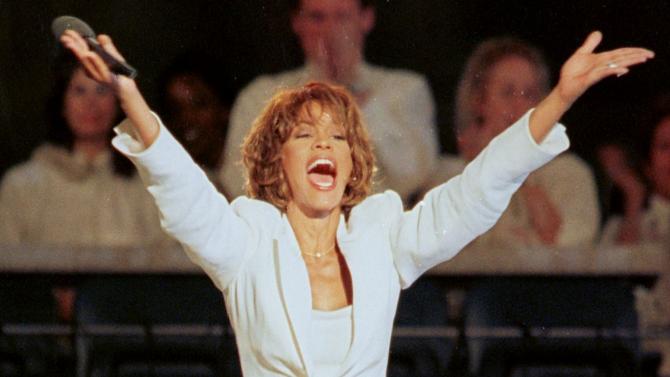[ad_1]

AFP
It was like a dirge of white noise all weekend. There was nowhere to hide at home because it was waiting in the background, calling to you from the next room, reminding you with a catchy hook of tragedy: Whitney Houston is dead.
But while listening to the mostly repetitive litany of commentary on the legend’s sudden death — she was talented, she was troubled, she was trying — one particularly smart talking head described Whitney as “the Jackie Robinson” of her time. Whitney wasn’t just loved by black people; people from East Orange, N.J.; or the young girls who’d idolized her since she sat giggling on the 1981 cover of Seventeen magazine.
Everyone loved her. And that collective, colorless coveting opened doors not just for other “crossover” pop divas like Mariah and Beyoncé but also for a little brown girl in a small town who saw another girl who looked like her only in the mirror.
I spent a third of my life growing up on Santa Catalina Island, 26 miles across the sea from Southern California and from the previous life my mother and I had known in South Central Los Angeles. The two of us were the only black people there. We lived in the conservative Christian town of Avalon, which in 1987 had a population of about 2,000.
To say I was an outcast on that tiny island — brown in a sea of white surrounded on all sides by blue — is to say the ocean is wet. The Cosby Show was my only respite, although a “friend” told me it wasn’t “real.” How could a doctor and lawyer who were both black be married? When I asked my mom, she said that some people were just ignorant. I wasn’t sure if she meant me (who’d asked) or my friend. I had few friends.
So when Wendy, the most beautiful girl in our sixth-grade class, asked me to sing in the annual Rotary Club talent show with her, I jumped at the chance. Wendy and I, along with the girl who boycotted The Cosby Show, were going to perform a special rendition of the Supremes’ “Stop! In the Name of Love.”
We practiced to a cassette tape after school — the self-defense move for “Stop!” and corkscrewing fingers from head to shoulder for “think it oo-oo-vah.” Wendy was our choreographer, costume designer and makeup artist. And the really genius part?
Wendy announced, as we practiced poses in front of her mother’s bathroom mirror, that we should all wear “foundation” — you know, to look more like the Supremes. Awesome idea. I ran home to tell Frances, my mother, that I needed to borrow some of her Fashion Fair. When she asked me what for, I told her.
“Can you believe these little fools wanted to perform in blackface?” I heard her say over the phone to someone back home. In the end I performed a solo “Wind Beneath My Wings” after three weeks of private singing lessons and won third place. I always say people expected me to be good.
The next year, I was poised for the top prize. A friend of the family sent over an emerald green dress made of taffeta and black velvet with voluminous sleeves that looked like fancy swimmies. My mother dyed a pair of lace stockings black to match. My “heels” had bows on the front that were bigger than my fists. I’d even gotten a perm. Now all I needed was an actual song to sing.
[ad_2]





















